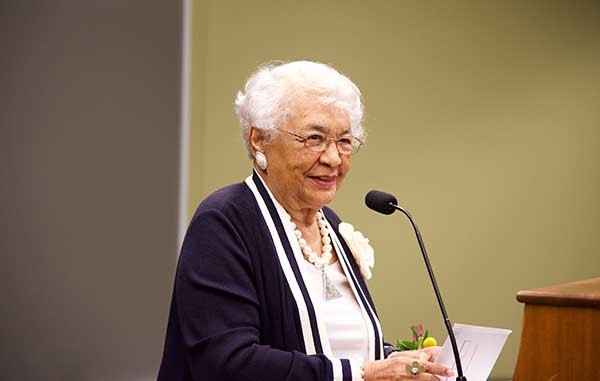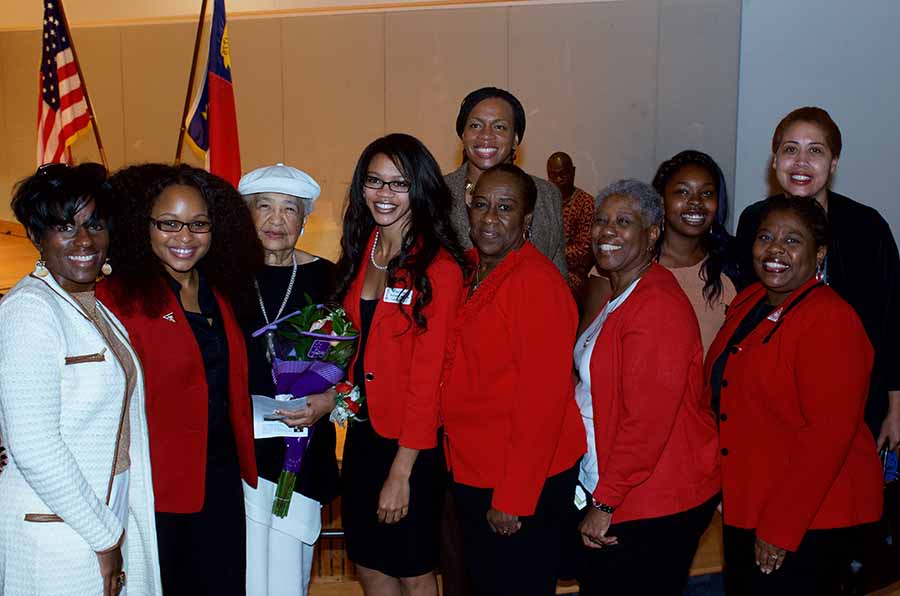University remembers pioneering educator Bertha Maxwell-Roddey

Bertha Maxwell-Roddey, Ph.D., founding director of the University’s Africana Studies Department, died March 21 at the age of 93.
Maxwell-Roddey joined UNC Charlotte’s College of Human Development (now Cato College of Education) in 1970. The educational pioneer was among the first Black principals to lead a white elementary school in Charlotte. The next year, she was named the Black Studies Program’s founding director, guiding its growth as it became the Afro-American and African Studies Program. In 1983, the program became the Department of African American and African Studies, the predecessor of today’s Africana Studies Department. Watch a brief video of the history of the department.
 Under Maxwell-Roddey’s leadership, the University held the initial planning meeting for the National Council for Black Studies, a professional organization whose founding purpose was to formalize the study of the African World experience as the discipline of Africana/Black Studies was developing. Today the organization is regarded as the “intellectual extension of the Civil Rights Movement.”
Under Maxwell-Roddey’s leadership, the University held the initial planning meeting for the National Council for Black Studies, a professional organization whose founding purpose was to formalize the study of the African World experience as the discipline of Africana/Black Studies was developing. Today the organization is regarded as the “intellectual extension of the Civil Rights Movement.”
Vanessa Gallman, who began undergraduate studies at UNC Charlotte in 1972 before transferring to UNC Chapel Hill to complete a journalism degree in 1976, was among the first students who participated in the University’s Black Studies Program. In 2020, her edited collection of essays “Who am I? Memoirs of a transformative Black Studies program” shares recollections of students from the first decade of UNC Charlotte’s Black Studies Program and how they were influenced by its courses, faculty and social/cultural opportunities.
UNC Charlotte Professor of History Sonya Ramsey chronicled the life of Maxwell-Roddey in the 2022 work “Bertha Maxwell-Roddey, a Modern-Day Race Woman and the Power of Black Leadership.”
“As the second African American full-time faculty member at UNC Charlotte, Maxwell-Roddey’s efforts to recruit and retain students are now permanent fixtures of the University. She developed foundational programs, initiatives and institutions such as orientation, wellness, accepted students summer enrichment, inclusive excellence and service-learning programs,” said Ramsey.
“Her UNC Charlotte legacy is multifaceted and multidimensional. It’s reflected within the hundreds of alumni who reminisce about how Bertha advocated for them while setting high expectations of academic excellence and community service. It’s embedded within the Black Studies curriculum, as Maxwell-Roddey worked with her fellow African American and African Studies colleagues to design an intellectually rigorous curriculum that also called for students to examine their own self-identity and purpose and serve their communities,” said Ramsey.
Not limiting her influence to education, Maxwell-Roddey joined forces with the late Mary Harper, professor of English, in 1974 to co-found the Afro-American Cultural Center, now the Harvey B. Gantt Center for African-American Arts + Culture. The two professors’ research uncovered a need to preserve history and landmarks of significance to African Americans in Charlotte, particularly as urban renewal projects demolished Black neighborhoods. They received the prestigious Order of the Long Leaf Pine in 2014 in honor of their work.
“I describe Dr. Maxwell-Roddey as a modern-day race woman in my book because she represents the often-overlooked women in local communities who dedicated their entire professional and civic lives to Black progress. Possessing a larger-than-life and charismatic personality, Maxwell-Roddey’s success involved her ability to know when to negotiate, when to confront, and when to leave. She also called her adversaries ‘in’ instead of calling them out. Even if she couldn’t sway them to her side, they respected her dedication to her cause,” said Ramsey.
In 2022, UNC Charlotte created a chapter of Phi Beta Kappa, the nation’s most prestigious academic honor society. Maxwell-Roddey was inducted as one of 11 founding members.
Maxwell-Roddey, who retired as UNC Charlotte’s Frank Porter Graham professor emeritus in 1986, was born June 10, 1930, in Seneca, South Carolina. She graduated from Johnson C. Smith University and later earned a Master of Education from UNC Greensboro and a doctorate from Union Graduate School in Cincinnati, Ohio.
During her distinguished career, she served on more than 50 boards and commissions, co-founded the Theodore and Bertha M. Roddey Foundation, started the first Head Start program in Charlotte and received numerous awards for her dedication. These included the Thurgood Marshall Award of Education, Elizabeth Catlett-Delta Legacy “Women Making a Difference” and the Eagle Fly Free Award from the Institute for the Advancement of Multicultural and Minority Medicine.
Initiated into the Gamma Lambda Chapter of Delta Sigma Theta Sorority Inc. while a student at Johnson C. Smith in 1951, Maxwell-Roddey was a current member of the Charlotte Alumnae Chapter, where she served as chapter president from 1964-66. She also served as the South Atlantic Regional director, national first vice president and the 20th national president.
As national president, she led the sorority to work with Habitat for Humanity, eventually building more than 350 houses in the United States, the Caribbean and Africa.
“We mourn with her family and friends this irreplaceable loss. We have lost an icon and some colleagues in Africana Studies have dubbed her a titan. She remains an exemplar for our individual and collective possibilities, which will only be soothed by the sustenance of her memory and the creation of new legacies” said Eddy Souffrant, professor and chair of the Africana Studies Department.
Maxwell-Roddey will be memorialized by Friendship Missionary Baptist Church at 3400 Beatties Ford Rd., Thursday, March 28. Her celebration of life begins at noon.